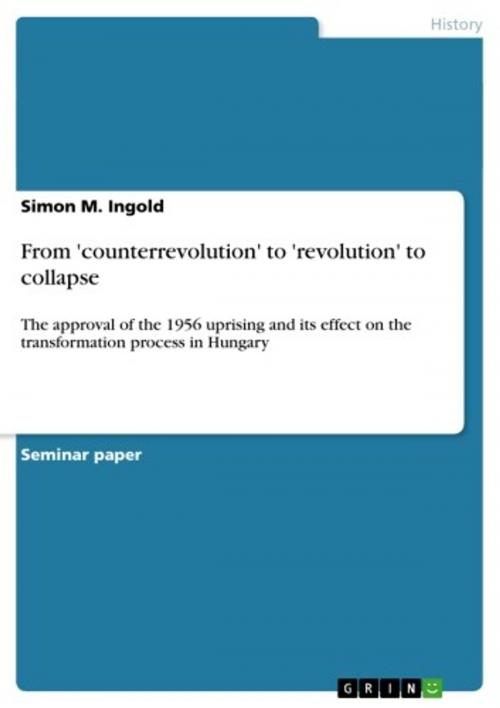From 'counterrevolution' to 'revolution' to collapse
The approval of the 1956 uprising and its effect on the transformation process in Hungary
Nonfiction, History, European General| Author: | Simon M. Ingold | ISBN: | 9783638897297 |
| Publisher: | GRIN Publishing | Publication: | January 21, 2008 |
| Imprint: | GRIN Publishing | Language: | English |
| Author: | Simon M. Ingold |
| ISBN: | 9783638897297 |
| Publisher: | GRIN Publishing |
| Publication: | January 21, 2008 |
| Imprint: | GRIN Publishing |
| Language: | English |
Seminar paper from the year 2005 in the subject History Europe - Germany - Postwar Period, Cold War, grade: Honors (Bestnote), Yale University, 8 entries in the bibliography, language: English, abstract: The public revelation of the Historical Subcommittee's findings by Pozsgay really stood at the beginning of a chain of further critical events - especially the highly symbolic re-interment of former Prime Minister Imre Nagy ? that eventually caused the peaceful collapse of the Hungarian 'people's democracy'. It can therefore rightly be called the root cause of the rapid disintegration of socialist rule in Hungary. The Politburo members' different reactions to this unexpected and radical step are highly indicative of the deep fault lines that existed between the reformist and conservative wings of the party. But they also express a shared insight that a point of no return had been reached. Based on the minutes of the meeting of the MSzMP CC Political Committee, I will try to clarify the signifi-cance of the moment and its relevance for the further course of events. First, I present the historical background of the document, specifically its principle point of reference, the 1956 uprising. This is followed by an analysis of the document itself. What views are expressed? How stringent is the ar-gumentation, i.e. what are the consistencies and contradictions? Finally, I will comment on the rele-vance of the document with regard to the ensuing historical developments in Hungary.
Seminar paper from the year 2005 in the subject History Europe - Germany - Postwar Period, Cold War, grade: Honors (Bestnote), Yale University, 8 entries in the bibliography, language: English, abstract: The public revelation of the Historical Subcommittee's findings by Pozsgay really stood at the beginning of a chain of further critical events - especially the highly symbolic re-interment of former Prime Minister Imre Nagy ? that eventually caused the peaceful collapse of the Hungarian 'people's democracy'. It can therefore rightly be called the root cause of the rapid disintegration of socialist rule in Hungary. The Politburo members' different reactions to this unexpected and radical step are highly indicative of the deep fault lines that existed between the reformist and conservative wings of the party. But they also express a shared insight that a point of no return had been reached. Based on the minutes of the meeting of the MSzMP CC Political Committee, I will try to clarify the signifi-cance of the moment and its relevance for the further course of events. First, I present the historical background of the document, specifically its principle point of reference, the 1956 uprising. This is followed by an analysis of the document itself. What views are expressed? How stringent is the ar-gumentation, i.e. what are the consistencies and contradictions? Finally, I will comment on the rele-vance of the document with regard to the ensuing historical developments in Hungary.















